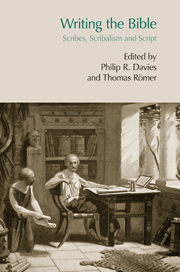Book contents
- Frontmatter
- Contents
- Abbreviations
- 1 Introduction
- I Writing in the ancient world
- II Hebrew Bible and early Judaism
- III Early Judaism and early Christianity
- 10 Some scribal features of the thematic commentaries from Qumran
- 11 Efficacious writing: the inscription of the rosette on the High Priest's forehead and the Egyptian reception of Exodus 28
- 12 The prose writer (συγγραφεύς) and the cultures of author and scribes: the examples of Galen and the anonymous author of Luke-Acts
- 13 Peter and his secretary in Pseudo-Clement
- 14 On the danger of writing according to Origen
- Index of biblical and other ancient sources
- Author index
14 - On the danger of writing according to Origen
- Frontmatter
- Contents
- Abbreviations
- 1 Introduction
- I Writing in the ancient world
- II Hebrew Bible and early Judaism
- III Early Judaism and early Christianity
- 10 Some scribal features of the thematic commentaries from Qumran
- 11 Efficacious writing: the inscription of the rosette on the High Priest's forehead and the Egyptian reception of Exodus 28
- 12 The prose writer (συγγραφεύς) and the cultures of author and scribes: the examples of Galen and the anonymous author of Luke-Acts
- 13 Peter and his secretary in Pseudo-Clement
- 14 On the danger of writing according to Origen
- Index of biblical and other ancient sources
- Author index
Summary
Le simple fait d'écrire, de recourir à une transmission écrite, implique une revendication du magistral, du canonique …
(Steiner 2006: 11)THE BEGINNING OF THE PREFACE OF THE FIRST COMMENTARY OF ORIGEN
Thanks to the Philokalia and to Epiphanius, we can read the beginning of the preface of the first work published by Origen, the Commentary on Psalms 1–25. These initial lines are the foundation of a literary genre that played a crucial role in Christian tradition: the biblical commentary. If commentaries were written before Origen, they were few compared to the 260 books of tomoi composed by the Alexandrian. Apart from the quantity, the quality and influence of Origen's works make him the first author of a substantial exegetical oeuvre that marked Christian tradition for centuries.
The Preface of the commentary begins with a note on the impenetrable character of the Bible and the need of a method to unlock it:
God's oracles tell us that the sacred scriptures have been locked away and sealed with the “key of David”–also, perhaps, with the seal of which it said, “an impression of a seal, hallowed to the Lord”. They are sealed, in other words, by the power of the God who gave them, the power which is meant by the seal.
(Philokalia 2.1; Epiphanius, Panarion 4.6.1; tr. Williams 1994: 137)- Type
- Chapter
- Information
- Writing the BibleScribes, Scribalism and Script, pp. 189 - 200Publisher: Acumen PublishingPrint publication year: 2013



